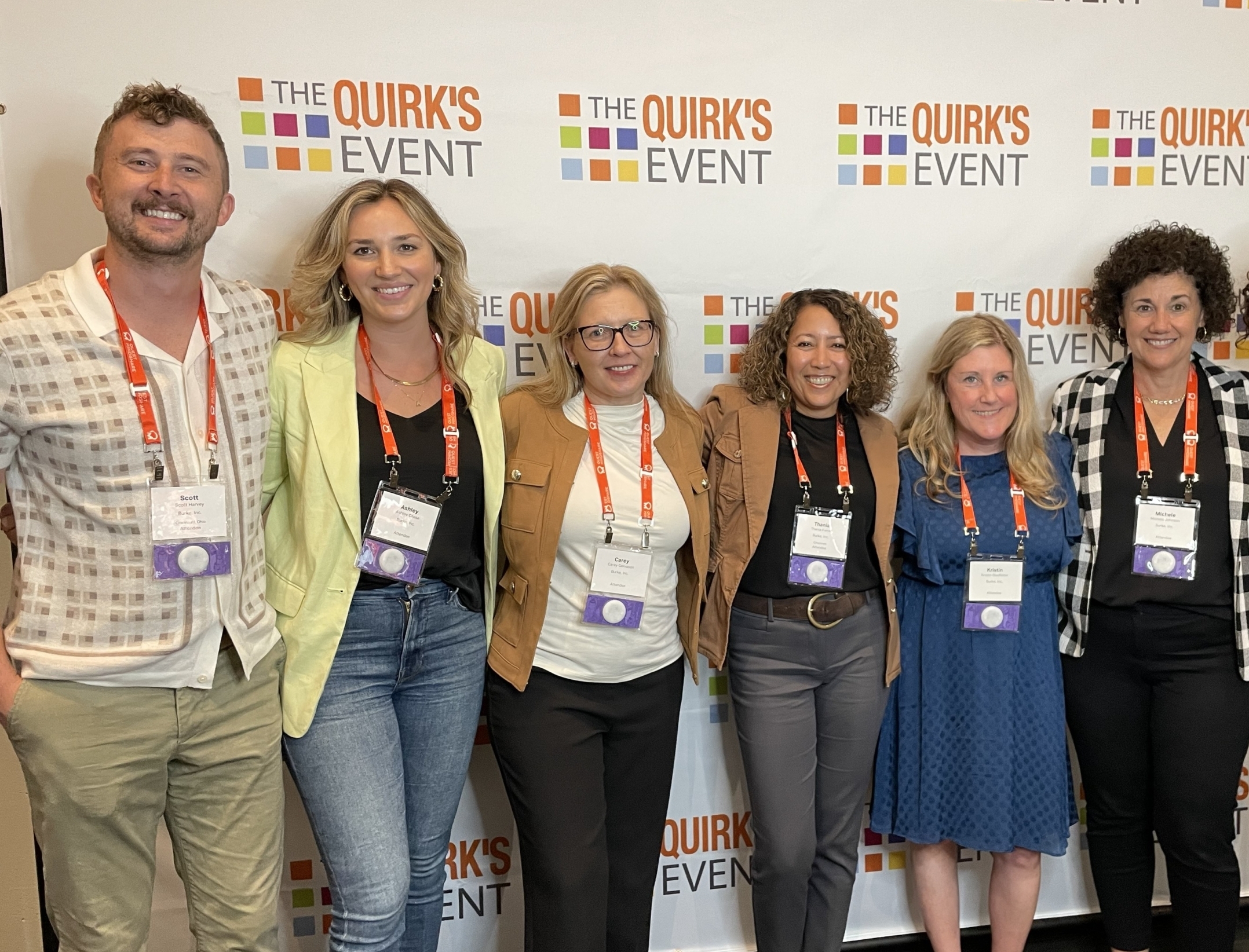
TOP TAKEAWAYS FROM QUIRK’S NEW YORK 2023
Recently, our team joined marketing research and insights peers in New York City at the Quirk’s New York Event. Brands across a variety of industries presented their latest findings on a range of innovative and trending topics. Here are a few of our top takeaways from the event:
An Empathetic Focus: Looking Beyond Consumer Data Points
Winning brands are focused on empathetically learning about people, not researching consumers – by better understanding lifestyles, attitudes, and behaviors outside of the category to market more authentically.
Presentations revealed that brands are finding success by infusing consumer empathy into their approach to research, starting with regular touchpoints and utilizing diverse methodologies. By leveraging “insider” consumer communities that remove the need for additional apps/hubs, conversational research (think open ends with emojis and gifs), and immersive qualitative methodologies, brands are emphasizing creativity and fun to build empathy and gain trust. These approaches lead to a more complete understanding of consumers and shoppers as humans.
Behavioral Data: Table Stakes for Compelling Insights
Traditional qualitative and quantitative research must be supplemented with behavioral data – from sources such as social media, sales data, projected techniques, etc. – especially when considering projects involving brand health, customer journey, or innovation components. Speakers made it clear that brands leveraging this holistic consumer perspective have a more complete strategy for addressing consumer needs and barriers through marketing and innovation efforts.
Generative AI: A Thriving Frontier of Evolving Innovation
Generative AI is creating both excitement (via trained text analytics for open end data and social media content) and concern (via survey fraud, fake ads/brand content, and data infringement). Businesses must be aware of the risks and realistic about the near-term reward.
Many researchers are finding balance from the potential risks by leveraging AI as a tool to help them “work smarter not harder.” Applications include efficiencies related to data cleaning, open-end synthesis, and generating narrative themes to assist with reports, helping researchers to generate insights more quickly, leaving more time to strategize around consumer needs.
The complexity with AI is that it is ever-evolving – so, a proactive, curious, and open approach to understanding and leveraging this emerging tool will be critical to harnessing its power.
Innovation Is Back: Embracing Agility and AI for Growth
Brands that put a pause on investing in innovation during the pandemic are refocusing in a big way. Innovation efforts have evolved to include more agile and less structured approaches, such as removing brand guardrails and letting imaginations fuel the innovation pipeline.
When it comes to evaluating innovation, brands are leveraging new concept testing techniques including higher stakes commitment (i.e., actually bidding on a concept you would buy), accelerating the stage at which concepts are tested (i.e., having enough of a concept to make a decision), and thinking more holistically about the context needed for consumers to make a purchase decision (i.e., understanding the full competitive set outside the category).
Of note, AI and agility are driving forces for this refreshed investment in innovation. By expanding AI toolkits, researchers can rapidly unlock new ideas, accelerating project timeframes to meet the ever-changing preferences of consumers more efficiently.
Inclusivity For All: Addressing In-Survey Inequities
Consumers with disabilities represent 20% of the US population – and have $500M in disposable income, but many are not able to participate in research studies due to insufficient accommodation.
Discussions stressed the increasingly importance of ensuring research does not just “represent” hard-to-reach audiences, but strives to be inclusive of these groups. It is imperative that researchers consider questionnaire design, UX, and sampling practices together to make sure all components of research are accessible to often under-represented individuals, including those with disabilities.
Additionally, when we incorporate inclusive design components with disabled individuals in mind, it can provide greater accessibility for a broader scope of individuals (e.g., Gen Z & A often prefer speech-to-text functionality).
Furthermore, emphasis was given to the fact that the collective research community (suppliers, panel providers, and client teams) must align to fuel future innovation in this space, driving inclusive practices to become the standard.
Data Quality is King: Challenges and Solutions in Online Surveys
Lastly, data quality continues to be a popular topic on the conference circuit – more specifically, the vulnerabilities and solutions for persistent challenges within the online panel space.
Discussions focused heavily on leveraging AI text analytics for open end responses, and a multitude of bot and fraud detection tools. This influx of solutions aims to address the rising frequency of fraudulent data in panel surveys, particularly for B2B research – where higher incentives can encourage bad actors. Due to the complexities within this space, the importance of partnering with well-informed, quality-focused agencies has never been higher.
Overall, the Quirk’s New York event was a valuable opportunity to learn and network with our industry peers. Thank you to our team for collaborating and contributing to this article. If you have any questions or feedback, please don’t hesitate to reach out to them!
As always, you can follow Burke, Inc. on our LinkedIn, Twitter, Facebook and Instagram pages.








